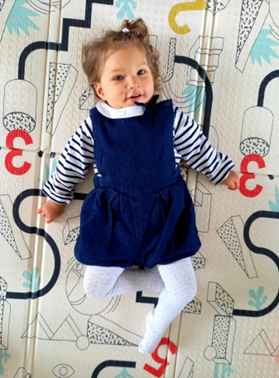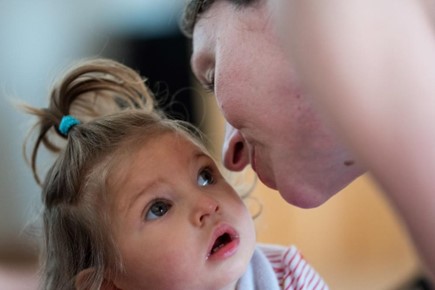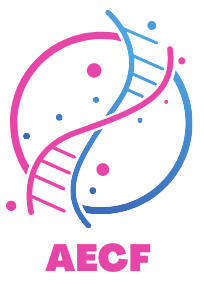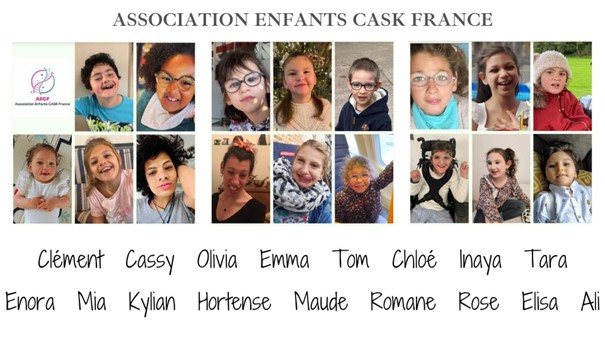Enora’s Story: CASK-related disorders
March 2023Hearing directly from patients is an essential aspect of understanding the reality of living with a rare disease. Patient testimonies provide a glimpse into the unique challenges faced by those with rare conditions, as well as their strength and resilience in the face of adversity. EURORDIS recognises the importance of these stories and aims to share them with the world to increase awareness, understanding, and support for those living with rare diseases.
Today, we will highlight the story of Enora, a little girl who was born three weeks early after an induction due to a growth inflection during the last weeks of pregnancy. Though she was small, weighing only 2.4 kg, she appeared to be healthy. However, when Enora was three months old, she was diagnosed with a rare neurological malformation called microcephaly with a very marked pontocerebellar hypoplasia. The diagnosis was a shock to her parents, who immediately sought out information and support from other families and associations.
Our daughter, Enora, was born 3 weeks early following an induction due to a growth inflection during the last weeks of pregnancy. Apart from that, Mum’s pregnancy went well and there was no indication on the ultrasound of what was to come. She was happy and healthy. The delivery also went well. Enora was a small baby (2.4 kg) just like her big sister born 3 years earlier. We were back home with our second baby, everything was going well, she was eating well and sleeping well. Pure bliss!
Three months later, it all took a dramatic turn. The unthinkable happened: Enora was diagnosed with a rare neurological malformation called microcephaly with a very marked pontocerebellar hypoplasia. The most common form of this malformation has a particularly poor prognosis with death occurring in infancy. This was a huge blow. We learned the news in the middle of July, which didn’t make it any easier to take care of our daughter’s illness and declare it. But even though we were literally stunned by what was happening to our little one, we very quickly contacted other families and associations to learn more about the few things that are known about this mysterious disease and what to expect in the future…
Not being a status-quo person, I immediately sought out anything that would help my daughter in her development (care, games, etc). I never accepted being told that nothing could ever be done to cure her.
When she was 9 months old, we learned that her brain malformation was due to a de novo mutation of the CASK gene on the X chromosome, which clarified the diagnosis (a little).

Mutations in the CASK gene mainly affect the nervous system and in particular the cerebellum and brainstem. This gene codes for a protein of the same name, which plays a key role in the proper functioning of neurons and synaptic transmission. The phenotypes resulting from mutations in the CASK gene form a wide spectrum of possibilities: the majority of mutations in boys are unfortunately often lethal in the first year of life (as they have only one copy of the CASK gene on the X chromosome) and girls living with severe to moderate intellectual disability are non-verbal and have mild to severe psychomotor disorders. Some also require feeding tubes, have drug-resistant epilepsy, have vision problems and hearing loss, or may still have problems with their breathing. Our daughter thus appears to be severely affected as she has severe cognitive delay, has axial hypotonia and hypertonia on the extremities, and has almost no gross and fine motor skills as she does not sit/crawl/roll from front to back or back to front. She has refractory epilepsy, bilateral optic nerve atrophy, hearing loss and has to be tube fed as she has great difficulty swallowing.
There is not enough data to estimate the life expectancy of people with CASK mutations. In general, everything is unknown about CASK-related disorders because the cases are too rare to be of interest to research and medicine.

Several things helped me to hold on in this storm and not to give up or even commit the irreparable. Firstly, my eldest daughter who called me back to earth several times. I will never forget her words when I tried to play with her but clearly wasn’t in the mood: “Daddy, when you play with me, I’d like you to laugh with your mouth but also with your head”. Children have this gift of hitting so right and so simply. Secondly, my wife, who has always kept her feet on the ground and still today forces me to live simple things as a family that I too easily prevent myself from doing. She has been my best psychologist. Finally, our grandparents who gave us the most beautiful gift by offering us their time to help and support us in looking after our daughters, especially in the very complicated moments linked to hospitalizations, “nights” shortened to a few hours, and for the many medical appointments, etc.
I continued, and still continue, to do research online on everything related to CASK. I soon found the online Facebook group for CASK genetic disorders. There I found families who were living or had lived through the exact same tornado we were going through. It was also there that I discovered the existence of associations – the ACNRF and the CASK RESEARCH FOUNDATION – which were struggling to find researchers and raise funds for research projects to improve the living conditions of our little ones suffering from CASK gene mutations. They wanted to help a leading CASK researcher to continue his research into a possible treatment for the disease, and a laboratory in the US. This laboratory is already working on two rare diseases very similar to the CASK gene mutations and is pushing the boundaries of gene therapy. These are pioneering techniques that seek to ‘activate’ the CASK gene on the silent X chromosome. Without getting into the X-linked science, the theory of this implies that it could correct the disease and thus massively change the prognosis for our children. The price tag for this research programme is high – about $1.5 million.
I knew immediately that I wanted to join them and help them. The surest way to fail at something is not to try! Frustrated that by donating from abroad we did not receive a tax deduction and fearing that this would deter other French families from donating, I realised that a French charity for CASK was needed. I was quite reluctant to create one myself, as at that time I had already created an association for Enora to help us financially with her care, I had just returned to work, Enora’s medical appointments were intensifying… In short, I didn’t really know what I was getting into or where I was going to find the time for such an undertaking. I contacted other French families and a few highly motivated mothers replied. Through hard work and the unconditional support of the sister associations CRF and ACNRF based in Australia and the USA respectively, the ASSOCIATION ENFANTS CASK France was born in 2 months, in September 2022 for France and the DOM-TOM. It has since grown with the creation of a scientific council and has established links with the French rare disease health networks as well as other organisations and foundations working in the field of rare diseases.

Our four charities, spread around the world, are now partners and work together with the same common goal: to inform about CASK and to support CASK gene research. Although we have never physically met, I consider the trustees of the sister charities to be true friends and have full confidence in them. We also have a small US team who are not affiliated with any particular charity, but who help coordinate things, contact scientists and promote the CASK community database which is held by RARE-X. I strongly recommend that all new rare disease organisations sign up to RARE-X and work with them to create a comprehensive, secure (GDPR compliant) and patient-owned medical registry.
At the time of writing, about 20% of the CASK community we know of has joined RARE-X. Our UK colleagues have a proposed an epilepsy study, pending review by a world-renowned university, and a natural history study lined up by a well-known UK university. Our Australian colleagues continue to support the US researcher’s efforts on a drug that reduces or suppresses apoptosis in neurons expressing the mutated CASK variant and improves disease progression. We are continuing to contact French-speaking researchers and physicians for CASK and have already received feedback from one of them that they would like to develop fish or organoid model lines for future studies. We would also like to organise, with the support of the relevant rare disease reference centre in Paris, the first CASK Family Gathering Day in France next June. The trust and teamwork behind this is the reason why we have been able to act so quickly and effectively.
Although we are a newly established charity, we are gradually building our portfolio of fundraising initiatives. We have been able to raise funds through online lotteries, sales of solidarity chocolates and events such as sports tournaments and Christmas gift wrapping. Other actions are in the pipeline for 2023 but we are also thinking about joint actions with the ACNRF Australia and USA and the CRF. 2023 is just beginning but we are already full steam ahead!

Having a child with a severe, life-limiting disability is one of the worst things that can happen to a person. I would never wish Enora’s life or suffering on anyone. The life we now lead with this extraordinary little girl is a parallel life to the one we had before she arrived and the one we hoped she would have by our side. The illness has reshuffled the deck… But our greatest fear for Enora and her other CASK warrior friends remains the future with the too often delicate and thorny transition from child to adult in terms of medical follow-up, the lack of space in care facilities and the question of who will take care of them when we – the parents – are no longer there.
But looking at the future, it is already changing and it is not a question of foreseeing it but of facilitating it, and this is precisely what we are looking to do by supporting research on the CASK gene in the hope, of being able to offer new therapeutic options for this orphan disease as soon as possible.
So, although there will always be dark and difficult moments and probably more clouds in our lives, this adventure, if you can call it that, has opened my eyes even more to what is essential: friendship, love and life.
Sometimes life’s events break you into a million pieces, but when you finally put yourself back together, you find that you are probably a stronger and more whole person than before.
Although she may never know it, Enora is my greatest teacher, and the world is lucky to have her and her Xtraordinary friends all over this earth to make this world a better place.
Thierry Kervella
